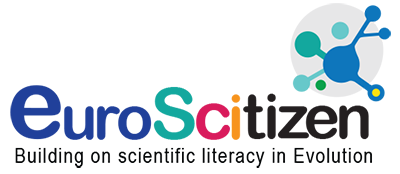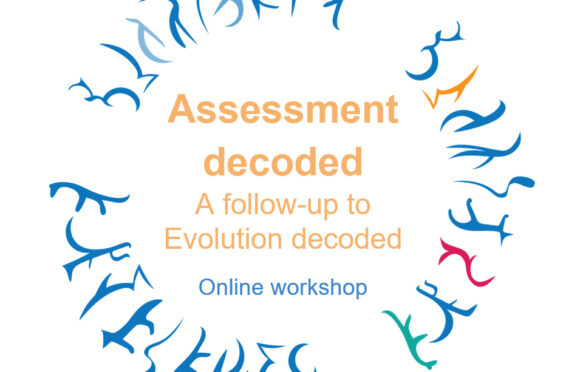For educators, science communicators and non-formal activity creators
Organised by: WG3 Non-formal education group of the Euroscitizen COST action
Joelyn de Lima, Bojan Kenig, Tamara Milosevic, Uroš Savkovic, Despina Tsopoglou-Gkina
Date of the workshop: May 31st 2022 16:00 to 18:00 CET
Workshop format: Online
Workshop language: English
Maximum number of participants: 40 admitted on a first-come first-served basis
(if more participants sign up, a waiting list will be formed)
Deadline for applications: May 29th 2022
Application form: https://forms.gle/dSRNGpZBcz7JepCWA
Workshop goals
This online workshop will offer educators, science communicators and non-formal activity creators an opportunity to learn about the assessment of evolution-themed activities. Using the online workshop ‘Evolution Decoded’ as an example, the workshop facilitators will demonstrate various aspects of non-formal/informal educational activities that can be assessed.
Through a series of interactive exercises, participants will practise designing assessments that are most relevant to their activities. Additionally, they will also get the opportunity to work through some simple data analysis methods to help them make sense of the data they collect, and use it to improve their education/communication activities.
Workshop topics
- Why assess your activities?
- What can you assess?
- When can you implement assessments?
- How do you make sense of the data?
Alignment with EuroScitizen goals
This workshop is organised by WG3 to empower and encourage non-formal activity creators and educators in general to incorporate assessment into their activity design. Using a previous WG3 dissemination event as an example, it will showcase the various aspects of such activities that could be assessed in order to improve non-formal education in general and evolution-themed non-formal education in particular.
This workshop has the aim to promote synergies between stakeholder groups (more specifically between different groups of educators, science communicators and artists) to maximise the public’s science literacy. It directly contributes to generating materials to empower different stakeholders to effectively use their knowledge and skills to contribute to evolution and science literacy. Finally, it promotes outreach actions, activities and events built by interdisciplinary teams to foster public scientific literacy and fight ‘fake news’.
Workshop facilitators
Despina Tsopoglou-Gkina
Despina is a biologist working in secondary education since 2016, as bridging her scientific interests with education has always been an aspiration of her. Having a research background in Biology (B.Sc.) and Ecology and Natural Resource management (M.Sc.), she is currently a Ph.D. candidate in Didactics of Biology aiming to shift her research focus on Science Education.
Joelyn de Lima
Joelyn thinks of herself as both a scientist and an educator, and therefore she is very passionate about science education (both formal and informal). Her academic training has been both in the natural sciences (Masters in Marine Science) and in Education (PhD focused on Undergraduate Biology education). She has experience teaching science in the classroom (grades 5-undergrad), and around the campfire (children and adults). Currently, she is working as a pedagogical advisor at EPFL, and is involved in numerous science education projects across the globe.
Bojan Kenig
Bojan holds a Ph.D. in biology. Before starting his work at the Centre for the promotion of science (CPN), he was employed as a researcher at the Department for Genetics of Populations, IBISS, University of Belgrade. From the start of his research career, he has been active in science communication projects. Bojan is currently responsible for designing, organising, and implementing informal education activities, mainly in STEAM disciplines. Furthermore, he has been continuously forming a sustainable network that brings together scientists and artists, encouraging their cooperation and the development of joint projects as a coordinator of the CPN art+science program.
Uros Savkovic
Uroš is an evolutionary biologist currently affiliated with the University of Belgrade. His research is focused on the experimental evolution approach in studying various phenomena including ageing, ability of host switching and the effects of population density using a seed beetle as a model system. All of his work is conducted at the Department of Evolutionary Biology at the Institute for Biological Research “Siniša Stanković”. Uroš loves to share the stories about evolution to the general public and is a passionate science communicator.
Tamara Milosevic
Tamara holds a Ph.D. in biology and she has been a formal and non-formal educator for adult learners for the last 10 years. In addition to developing and teaching project-based learning courses for interdisciplinary bachelor, master and PhD students in France, she is also a teacher trainer and pedagogical advisor at the Teaching support center at EPFL, Switzerland and a pedagogical coach on two Erasmus+ projects. Her passion for raising scientific literacy led her to co-found Rhizome Association, which strives to imagine and implement life-long learning focusing on skills development through projects at the interface of science and arts.

